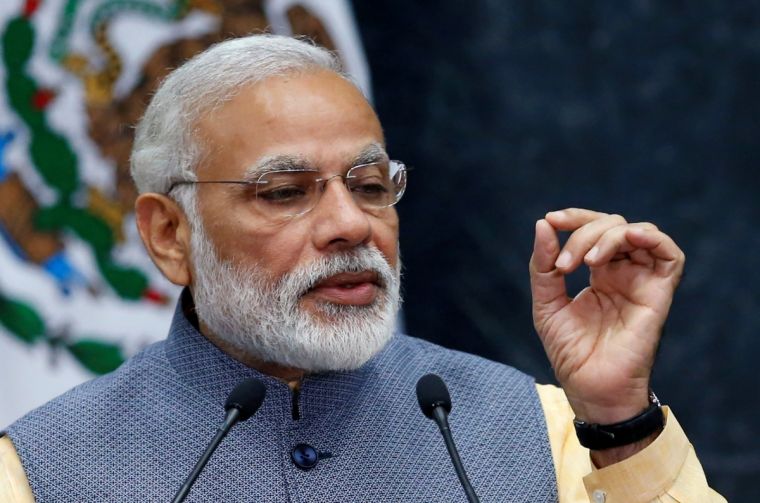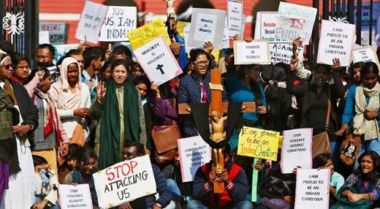India's religious freedom row

India's Prime Minister Narendra Modi on Wednesday insisted that religious freedom is enshrined in the country's constitution, and that India is "a modern nation with freedom, democracy, and equality as the essence of its soul."
He was speaking before a joint meeting of the US Congress in Washington, only the fifth Indian prime minister to do so. Modi, who took office in May 2014, told the room: "For my government, the constitution is its real holy book. And, in that holy book, freedom of faith, speech and franchise, and equality of all citizens, regardless of background, are enshrined as fundamental right."
He continued: "All the 1.25 billion of our citizens have freedom from fear, a freedom they exercise every moment of their lives".
Modi's speech is notable because he was previously banned from entering the US under a law that makes foreign officials who are responsible for "severe violations of religious freedom" ineligible for visas.
In 2005, he was denied a visa in the wake of a report by the US Commission on International Religious Freedom (USCIRF). The report said he had supported Hindu extremists during the 2002 Gujarat riots that resulted in the deaths of between 790 and 2,500 Muslims.
In 2008, then-chair of the commission Felice Gaer urged the US to uphold the ban. She said at the time: "As official bodies of the government of India have found, Narendra Modi is culpable for the egregious and systematic human rights abuses wrought against thousands of India's Muslims.
"Mr Modi must demonstrate to the State Department and to the American people why he – as a person found to have aided and abetted gross violations of human rights, including religious freedom – should now be eligible for a tourist visa."
However, in September 2014 Modi made his first official state visit to the US as Prime Minister, and is now said to be on good terms with Barack Obama – publicly addressing the President on first name terms several times during his visit to India last year.
His relationship with the US, however, is still showing some signs of strain.
A delegation from the USCIRF was denied Indian visas this March as a result of its 2015 report that said India had seen a rise in religiously-motivated violence for three consecutive years.
Government spokesperson Vikas Swarup said the report failed to show "proper understanding of India, its constitution and its society."
"India is a vibrant pluralistic society founded on strong democratic principles. The Indian Constitution guarantees fundamental rights to all its citizens including the right to freedom of religion," he added.
"Government does not see the locus standi of a foreign entity like USCIRF to pronounce on the state of Indian citizens' constitutionally protected rights. We take no cognizance of their report."
The USCIRF condemned the decision to deny its delegates visas. "As a pluralistic, non-sectarian, and democratic state, and a close partner of the United States, India should have the confidence to allow our visit," said chairman Robert George.
And in its 2016 report released in May, the USCIRF once again didn't hold back, highlighting a "negative trajectory" with regards to religious freedom in India.
"Minority communities, especially Christians, Muslims, and Sikhs, experienced numerous incidents of intimidation, harassment, and violence, largely at the hands of Hindu nationalist groups," it said.
"Members of the ruling Bharatiya Janata Party (BJP) tacitly supported these groups and used religiously-divisive language to further inflame tensions. These issues, combined with longstanding problems of police bias and judicial inadequacies, have created a pervasive climate of impunity, where religious minority communities feel increasingly insecure, with no recourse when religiously-motivated crimes occur."
The BJP is the political wing of the powerful Hindu nationalist NGO Rashtriya Swayamsevak Sangh, known as the RSS. The World Hindu Council, Vishwa Hindu Parishad (VHP), is the religious wing, which uses nationalist ideology to promote Hinduvata – equating being Indian with having a Hindu faith. Boasting almost seven million members, it regularly holds "reconversion" programmes, where Indian minority communities are encouraged to turn to Hinduism. The group has claimed that conversion to faiths other than Hinduism, including Christianity, is "the root of terrorism".

In the three months after Modi took power, nearly 2,000 branches of the RSS were established. In the first year of his rule, there was a rise in hate speech against religious minorities from senior people within these organisations, and a surge in attacks – more than 600 cases of violence between May 2014 and May 2015, the majority of them against Muslims, and at least 43 deaths.
A country expert from religious freedom charity Christian Solidarity Worldwide (CSW) told Christian Today that while Modi claims that religious freedom is enshrined in the constitution, that isn't playing out in reality.
"He has said that India recognises the diversity of the various religious beliefs in the community, but what we're seeing on the ground is the opposite," he added.
The source, who remained anonymous for security reasons, explained that under the BJP government, a space has been created for the fundamentalist groups that subscribe to the Hinduvata ideology. "There are more groups that have been emboldened to intimidate and to attack religious minorities, the majority of whom are Muslims or Christians," he said. "This has grown in the last two years".
During a recent trip to India, he was told that Christians are being attacked every single day in India. Muslims bear the brunt of religious persecution, due to an ongoing feud with neighbouring Pakistan and fears about Islamic extremism, but Christians are suffering too, and the problem goes under-reported.
In some areas where the RSS has influence, police don't take seriously accusations of persecution made by Christians. Many Christians have also found themselves falsely accused of forced conversions; a charge which carries a heavy penalty under the anti-conversion laws. The source recounted a story of one pastor who was forced to take on manual labour because of debts he incurred as a result of having to post bail after being accused of trying to force Hindus to become Christians.
"It's an added layer of persecution," Christian Today was told. "Persecution is not necessarily always physical, but also monetary."
Modi last November made his first state visit to the UK, and CSW was among a number of human rights organisations that called on the British government to take a stronger line on religious freedom in India.
The source told Christian Today that the UK is "absolutely" still too soft on the issue because it wants to protect its trade relationship. But if countries like Britain and the US don't adopt a tougher approach, religious freedom will undoubtedly worsen for religious minorities in India.
"I think not doing that sends a very sad message to religious minorities in India who are looking to the UK as a nation that would promote democracy and the rule of law. We talk so much about freedom of religion and belief in our country, we need also to be boldly speaking about it with the people we trade with, and the UK has done very little on that front," he said.
"As long as the nations trading with India are not willing to address issues relating to freedom of religion or belief – the freedom of expression, growing intolerance, freedom of the press – things will get worse," he added.
"Fundamentalists in India are still celebrating over the victory of the BJP because Mohan Bhagwat [the chief of the RSS] made it very clear that when the BJP was in power, it was time for the Hinduvata ideology to mushroom, and a time to reclaim India to its former glory.
"Unless we tackle what's going on in India, this ideology will keep on growing."











